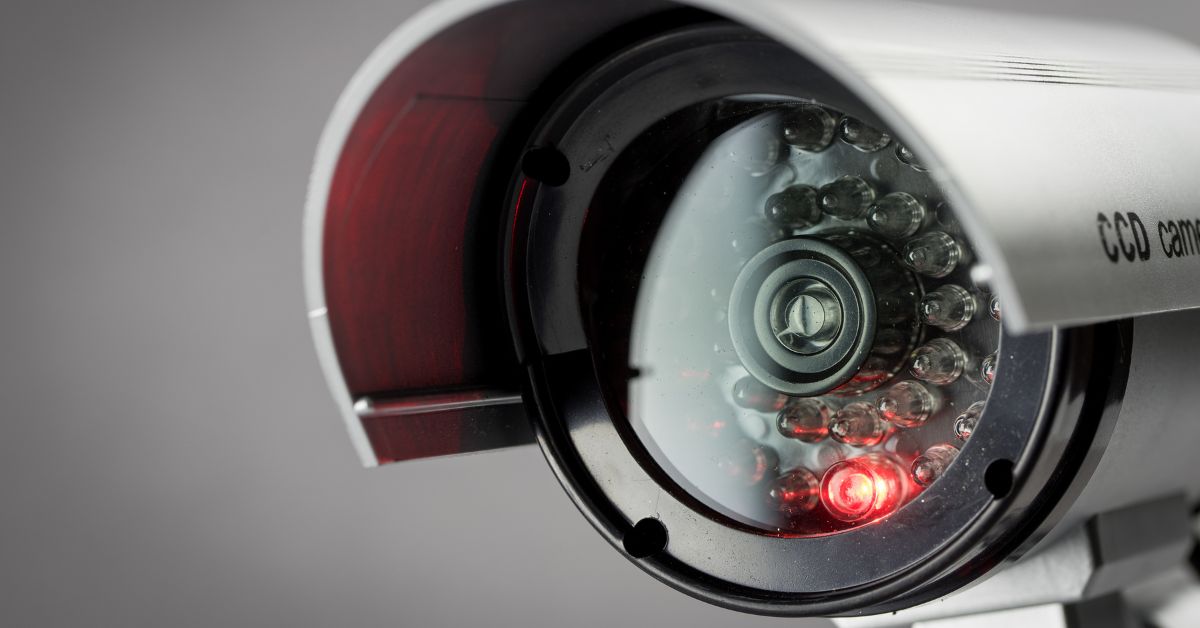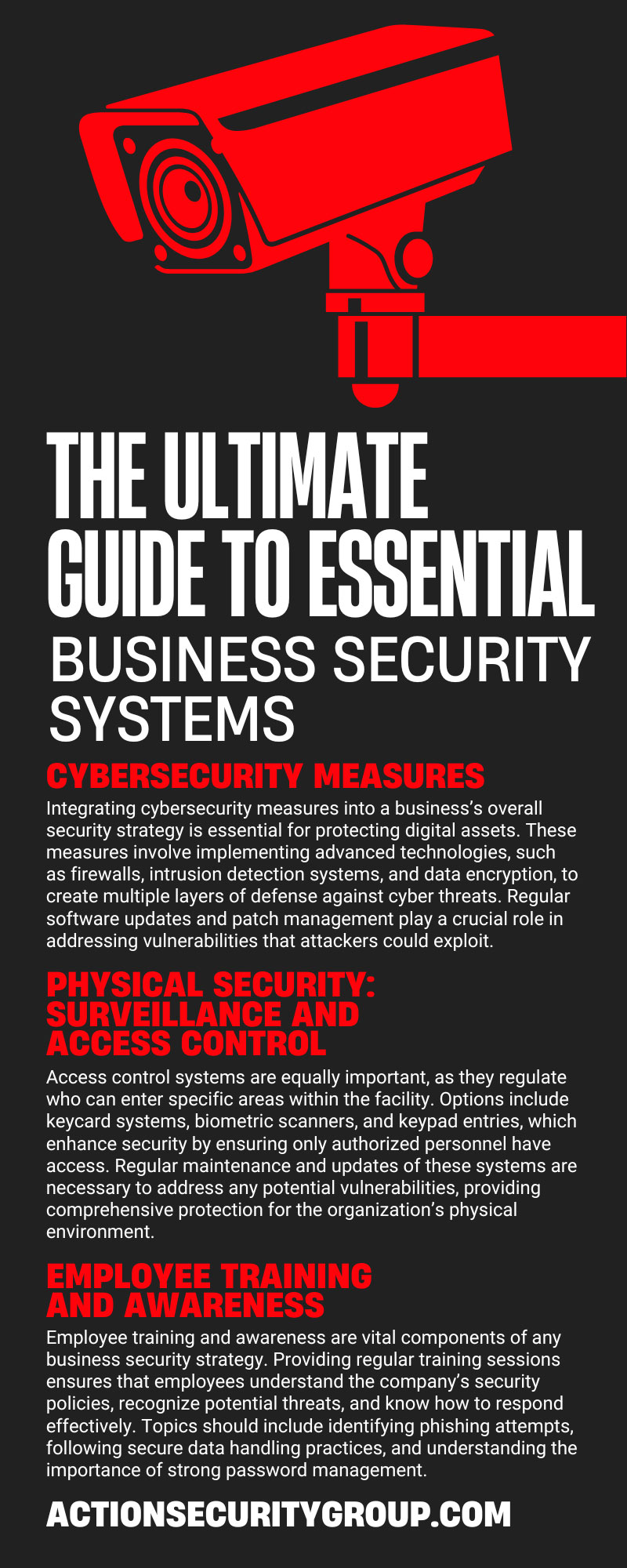The Ultimate Guide to Essential Business Security Systems
Protect Your Workspace, Safeguard Sensitive Snformation, & Ensure the Eafety of Eour Employees

In today’s rapidly evolving business landscape, security has become an essential consideration for organizations of all sizes. With increasing threats ranging from cyberattacks to physical breaches, investing in robust security systems is crucial for protecting valuable assets, sensitive data, and employee safety.
Let’s look at this ultimate guide to essential business security systems and explore the various components, considerations, and best practices for creating a comprehensive security plan.
Business Security Needs
To effectively safeguard their operations, businesses must first assess their unique security needs. Factors such as the industry type, size of the organization, and the nature of their sensitive data or assets all play a vital role in determining the level and type of security required. It’s essential to conduct a thorough risk assessment that identifies potential vulnerabilities and threats.
Businesses should consider both physical security measures, such as surveillance cameras and access control systems, and cybersecurity protocols to protect against data breaches. Furthermore, engaging employees in security training enhances awareness and promotes a culture of vigilance. By tailoring security solutions to their specific requirements, organizations can ensure both proactive measures and responsive strategies are in place to address any security challenges.
Types of Security Systems
There are several types of security systems that businesses can implement to protect their assets and information. Physical security systems include surveillance cameras, alarm systems, and access control systems that regulate who can enter certain areas. Video surveillance helps deter crime and can provide crucial evidence in case of incidents. On the cybersecurity front, firewalls, antivirus software, and intrusion detection systems safeguard against digital threats.
Additionally, security information and event management (SIEM) systems offer centralized monitoring and analysis of security alerts generated by network hardware and applications. Furthermore, cloud security solutions provide data protection in cloud environments, ensuring that sensitive information remains secure during storage and transmission. By combining these various systems, businesses can create a robust security infrastructure tailored to their needs.
Cybersecurity Measures
Integrating cybersecurity measures into a business’s overall security strategy is essential for protecting digital assets. These measures involve implementing advanced technologies, such as firewalls, intrusion detection systems, and data encryption, to create multiple layers of defense against cyber threats. Regular software updates and patch management play a crucial role in addressing vulnerabilities that attackers could exploit. Additionally, establishing a strong password policy, coupled with multi-factor authentication, can significantly reduce the risk of unauthorized access.
Employee training is vital as well, ensuring all staff members are aware of phishing scams and social engineering tactics. By fostering a culture of cybersecurity awareness within the organization, businesses can mitigate risks and enhance their overall security posture, safeguarding sensitive data and maintaining operational integrity.
Physical Security: Surveillance and Access Control
As mentioned, physical security is a critical component of an effective security strategy, encompassing measures that protect an organization’s tangible assets. Surveillance systems, such as CCTV cameras, act as a deterrent for criminal activity while providing valuable evidence in the event of a security breach. These systems should be strategically placed to cover vulnerable areas, such as entrances, parking lots, and high-value asset locations.
Access control systems are equally important, as they regulate who can enter specific areas within the facility. Options include keycard systems, biometric scanners, and keypad entries, which enhance security by ensuring only authorized personnel have access. Regular maintenance and updates of these systems are necessary to address any potential vulnerabilities, providing comprehensive protection for the organization’s physical environment.
Employee Training and Awareness
Employee training and awareness are vital components of any business security strategy. Providing regular training sessions ensures that employees understand the company’s security policies, recognize potential threats, and know how to respond effectively. Topics should include identifying phishing attempts, following secure data handling practices, and understanding the importance of strong password management.
Encouraging a culture of security within the workplace fosters proactive behavior, where employees feel responsible for maintaining a secure environment. Additionally, organizations can conduct simulated security incidents to test employees’ responses and reinforce learning. Regularly updating training materials and conducting refresher courses will help keep security top-of-mind. Empowering employees with knowledge is key to building a resilient security posture that protects the entire organization.
Regular Risk Assessments and Updates
Conducting regular risk assessments and updates is crucial for maintaining an effective security strategy in any business. These assessments help identify new vulnerabilities and evaluate the effectiveness of existing security measures in response to changing threats. By systematically reviewing risks, organizations can prioritize their security investments and implement necessary adjustments to their systems and protocols.
It is important to involve key stakeholders in the assessment process, ensuring a comprehensive understanding of potential risks across various business areas. Furthermore, regular updates to security policies and procedures allow businesses to keep pace with industry best practices and regulatory requirements. Establishing a schedule for risk assessments, such as quarterly or bi-annually, can foster a proactive security culture, ensuring that risks are managed effectively and that the organization remains resilient against potential threats.
Compliance and Regulatory Considerations
Compliance and regulatory considerations are integral to developing an effective business security strategy. Organizations must navigate a complex landscape of legal and industry-specific regulations that dictate how data should be protected and handled. Adhering to standards such as the General Data Protection Regulation (GDPR) or the Health Insurance Portability and Accountability Act (HIPAA) is essential for avoiding potential fines and legal repercussions.
Businesses should conduct regular compliance audits to ensure that their security measures align with these regulations, addressing any deficiencies promptly. Additionally, maintaining clear documentation and policies related to security processes can demonstrate due diligence in the event of an audit. By prioritizing compliance, businesses not only safeguard their assets but also enhance their reputation and trust among clients and partners.
Establishing these essential business security systems is vital for any organization seeking to protect its assets, data, and personnel in an increasingly complex threat environment. By integrating physical security measures, robust cybersecurity protocols, and ongoing employee training, businesses can cultivate a resilient security posture that adapts to emerging challenges. Regular risk assessments and adherence to compliance regulations further enhance this framework, ensuring that security measures remain effective and aligned with industry standards. Ultimately, fostering a culture of security awareness and vigilance among employees will empower them to contribute to the organization’s overall safety, enabling businesses to operate with confidence in today’s dynamic landscape.
If you need business security systems in Rochester, NY, Action Security Group can help. With over 40 years of experience, we offer a wide range of security solutions tailored to your unique requirements. Contact us today to learn more about how we can help you protect your business.
